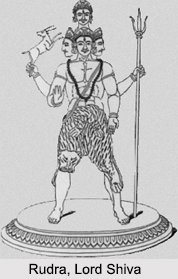 The earlier version of the Lord Shiva is known as Rudra. He is considered to be one of the inferior Gods. Rudra happens to be a Rig Vedic Deity who is associated with hunt and the storm. In the Vedas, he has been praised as “mightiest of the mighty.†He is personification of the word "Terror."
The earlier version of the Lord Shiva is known as Rudra. He is considered to be one of the inferior Gods. Rudra happens to be a Rig Vedic Deity who is associated with hunt and the storm. In the Vedas, he has been praised as “mightiest of the mighty.†He is personification of the word "Terror."
Etymology and Forms of Lord Rudra
There are varied meaning of the word `Rudra`. The Sanskrit name Rudra is derived from the `rud` or `to cry, howl`. Rudra also means the Red, the Brilliant. It also means to shine. Rudra is connected with `Raudra` which means wild, that`s why Rudra is related with lord Shiva, the Fierce God. Rudra is called `the Archer` and the arrow is an essential attribute of Rudra.
In other contexts, it simply means the eleventh number. The word eye of the rudra or rudraksha is referred as a name both for berry of the rudraksha tree and a ring of prayer beads as well, made from the seeds.
Rudra and Rig Vedic Hymns
The Rudra has its earliest mentions in the Rigveda. Three hymns are entirely dedicated to him. Overall, there are about seventy-five references to Rudra.
| Sanskrit | English Translation |
| sahasravrdiyam bhumih | This world is desired as a place of abode by thousands of Jeevarasis |
| param vyoma sahasravrt | The upper world is similarly desired by the thousands of devas. |
| asvina bhujyu nasatya, visvasya jagataspati | The earth and the heaven (Svarga lOkam) are like the twin gods, Asvini devas, who banish diseases and bless us with bhogams; Asvini devas are the protectors of the universe and their sankalpam (volition) never fails. |
| jaya bhurmih patirvyoma, mithunanta aturyathuh | Bhulokam is the wife and the Heaven is the husband; they are united like a couple |
| putro brhaspati rudrah | We have to consider Brhaspati and Rudran (aging here) as their sons |
| sarama iti stripumam | The raised platform for the Yaagam, Yaaga medai (Yajn-a Vedi) should be considered as a lady. |
| Thus we are instructed about the male-female aspects of the Earth and the Heaven. |









